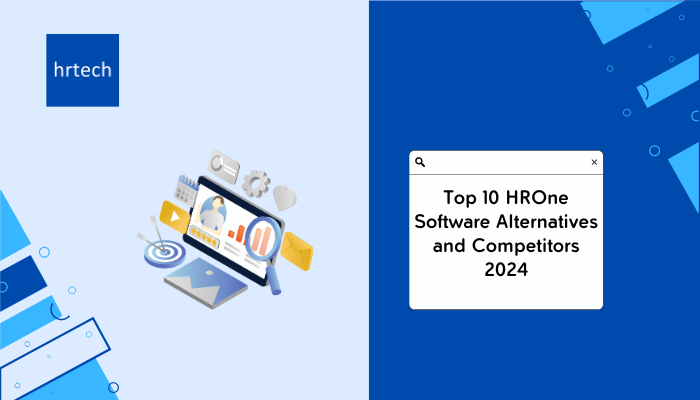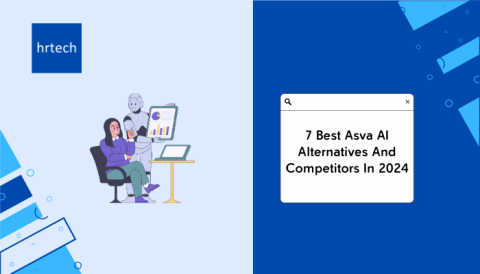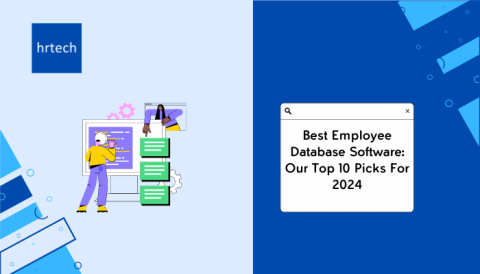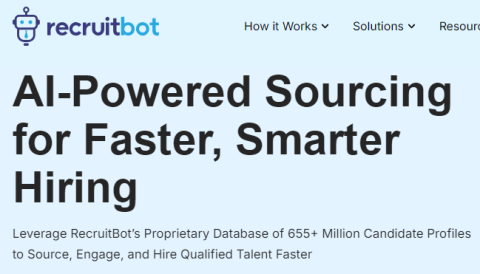HROne is a popular HR and payroll software with many features. But it will not be the best fit for every company. As businesses grow and change, they often look for other options that might be cheaper, easier to use, or better suited to their specific needs. There are many different HR software choices out there for companies wanting to improve how they manage their employees.
In this guide, we’ll compare the 10 best HROne alternatives and competitors for 2024. We’ll explore each software’s essential features, pros and cons, and pricing to help you choose the right solution.
Ready to find the best alternative to HROne for your business? Let’s get started!
What is HROne?
HROne is a popular HR and payroll software designed to make employee management, payroll, compliance, and employee time tracking more accessible for businesses of all sizes. It offers features like employee data tracking, leave management, payroll processing, and time tracking, all in one platform.
HROne helps businesses streamline HR tasks, manage employee hours, and ensure compliance with regulations. Its easy-to-use interface and customizable tools make it a top choice for companies looking to simplify HR processes.
HROne is doing well in 2024, according to G2, a popular website where people review software. G2 looked at what customers say and how happy they are with different HR software. They found that:
- HROne is the 3rd best when it comes to making customers happy.
- It’s also the 8th-best HR software overall.
These rankings are for all HR software worldwide, not just in one country. Therefore, HROne is considered one of the top choices globally for managing human resources in companies.
Pros and Cons of HROne
Pros:
- All-in-one HR and payroll solution.
- Easy to use, with customizable features for different business sizes.
- Strong payroll and compliance capabilities, especially for businesses in India.
- Helps automate HR tasks, saving time for HR teams.
Cons:
- Limited integration with other platforms.
- Lacks advanced talent management and analytics features.
- It will not suit global businesses with complex HR needs.
- Higher costs for small businesses needing extra features.
Why Choose an HROne Alternatives?
Thinking about how automated HR and payroll software will streamline your business operations is essential. Many modern HR platforms handle basic tasks like payroll and employee data tracking and automate complex processes like compliance, talent management, and performance reviews.
By exploring alternatives, such as BambooHR or Deel, you will find a solution that offers more advanced automation features, helping your business operate more efficiently. For more details on how automation will benefit your HR operations, read our guide on enhancing HR and payroll processes with automation.
Comparing The Best HROne Alternatives And Competitors In 2024
Choosing the right HR software will be challenging, especially when considering your company’s needs.
Each platform offers unique strengths, whether you’re focused on payroll automation, global compliance, or employee management.
| Software | Best For | Standout Feature | Pricing |
| BambooHR | Employee Information Management | Easy employee onboarding and tracking | Essentials: $108 + $5.40 per additional; Advantage: $180 + $9 per additional |
| Deel | Global Payroll and Compliance | Customizable dashboard and support | $29/month (Global); $19/month (US) |
| Hibob | Mobile-Friendly HR Management | Clean interface and mobile access | $16 to $25 per month |
| Darwinbox | Enterprise-Level HR Management | Mobile-friendly with strong analytics | $1/year |
| Zoho People | Affordable HR Software | Low pricing, great for small teams | $1 per month |
| ADP Workforce Now | Large Enterprises | Advanced payroll and HR features | $2 to $10 per month, minimum $49 |
| Paycor | Comprehensive HR and Payroll | Cost-effective with robust features | $99 per month; |
| OnPay | Small Business HR and Payroll | Affordable, user-friendly pricing | $40 per month |
| Rippling | HR and IT Systems Management | Seamless payroll and IT integration | Custom Pricing |
| Paychex Flex | Simplified Payroll and HR | Time-saving payroll automation | $39 per month |
1. BambooHR

BambooHR is a complete HR tool designed to simplify key tasks like onboarding, tracking employee data, and managing performance. It’s known for being simple to use and is perfect for small—to mid-sized businesses that want to automate admin work and boost employee satisfaction.
Pros:
- Great for keeping track of employee info and reports.
- Simple onboarding and offboarding tools for new hires and exits.
- Helps streamline performance reviews with easy-to-use tools.
- User-friendly interface that HR teams of any size will use easily.
Cons:
- It will not offer the advanced features required by larger organizations
- Customization options are somewhat restricted
- Reporting capabilities will be more robust
- Users have noted that the mobile app will use enhancements
Features:
- Employee Data Management: All employee info is stored in one place, making it easy to access and report.
- Onboarding/Offboarding Tools : ensure a smooth experience for new employees from day one and simplify the exit process.
- Performance Management: Custom review schedules and real-time feedback help improve employee performance and engagement.
- HR Reporting & Analytics: Provides detailed reports on workforce data, turnover, and performance trends.
BambooHR vs. HROne:
BambooHR is best for employee engagement and performance management. Its simple interface makes onboarding and data tracking easier, helping HR teams improve employee satisfaction and development.
While BambooHR excels in onboarding and engagement, HROne is better for payroll and compliance, making it the right choice for companies needing an all-in-one HR and payroll solution.
Pricing:
BambooHR has two plans: the Essentials plan starts at $108 per month for up to 20 employees, with an extra $5.40 per employee after that. The Advantage plan starts at $180 monthly for 20 employees, with $9 per additional employee.
User Feedback:
“BambooHR has changed the way we handle employee data and onboarding. The performance tracking features have made reviews much smoother and have kept our team engaged.” – Yatin Garg
2. Deel

Deel is an HR platform designed to manage global teams. It helps businesses handle international payroll, compliance, and contracts, making it perfect for companies with workers in different countries. Deel’s easy-to-use dashboard and strong customer support help businesses comply with global labor laws as they grow.
Pros:
- Great for managing payroll for employees in different countries.
- The customizable dashboard lets businesses track the most critical data.
- Quick and easy to set up, saving time for HR teams.
- Excellent customer support to help with international payroll and compliance issues.
Cons:
- Lacks some deeper HR features like performance reviews and employee engagement tools.
- Limited integrations with other software will be an issue for businesses with complex tech needs.
- There will be better fits for companies looking for a complete HR system beyond payroll.
- The user interface will be improved to make navigating certain features easier.
Features:
- Global Payroll Management:Automatically calculates payroll across different countries, including taxes, benefits, and compliance with local laws.
- Compliance Management: Helps companies follow labor laws and tax regulations in every country, making global operations easier.
- Customizable Dashboard: Allows businesses to adjust the dashboard to focus on the most relevant metrics and data.
- Contract Management: Simplifies the creation and management of contracts for remote employees and contractors, ensuring legal compliance.
Deel vs. HROne:Deel is the best choice for managing global payroll and staying compliant with international laws. It handles complex payroll needs for businesses with remote teams across different regions.
HROne offers more HR tools like performance reviews and employee engagement. It’s a better option for businesses needing a full HR system beyond payroll.
Pricing:
Deel charges $29 per employee per month for global payroll and $19 per employee per month for US payroll.
User Feedback:
“Deel has made managing global payroll so much easier. It’s simple to set up and works great for handling remote teams. Compliance has never been simpler.” – Olivier Joyal
3. Hibob

Hibob is an HR platform designed to be mobile-friendly, making it great for businesses with remote teams. Its easy-to-use interface allows HR tasks to be managed on the go, and it provides strong tools to keep employees engaged and improve their experience at work.
Pros:
- Great mobile-friendly design, ideal for remote teams.
- Offers a wide range of HR tools for managing employee information, performance reviews, and engagement.
- Strong features for improving employee engagement and company culture.
Cons:
- will be expensive, especially for small businesses.
- Reporting tools are not as powerful as some competitors.
- will lack advanced features larger companies might need.
Features:
- Mobile Access: Manage HR tasks from anywhere, perfect for teams on the move.
- Performance Reviews & Engagement Surveys: Custom tools to track employee performance and gather feedback.
- Employee Self-Service Portal: Allows employees to manage their own info, request leave, and access personal data.
Hibob vs. HROne:
Hibob is great for remote teams because of its mobile design and advanced employee engagement tools.
HROne has better payroll and compliance tools, which are essential for businesses in countries with strict labor laws.
Pricing:
Hibob charges between $16 and $25 per employee each month. There will also be a setup fee of 10-20% of the annual cost.
User Feedback:
“Hibob has been an excellent platform for managing our remote team. The mobile access and engagement tools have really helped improve employee satisfaction.” -Rana Salman
4. Darwinbox
Darwinbox is an HR platform designed for large companies. It offers advanced analytics, mobile access, and coverage of the whole employee lifecycle, from hiring to performance management.
Pros:
- Robust analytics help HR teams make decisions based on data.
- Mobile access allows employees and managers to use the platform from anywhere.
- Comprehensive HR tools for large companies, covering all areas of HR.
Cons:
- It will be hard for smaller teams to learn.
- Higher cost, which will not be ideal for smaller businesses.
Features:
- Mobile Access: Easy for large teams to access from anywhere.
- Talent & Performance Management: Tools to track performance, set goals, and help employees grow.
- Real-Time Reporting: Gives insights into employee performance to help HR teams manage better.
Darwinbox vs. HROne:
Darwinbox is ideal for large enterprises that need advanced HR tools and data analytics.
HROne is Better for small businesses that need more straightforward HR tools at a lower cost.
Pricing:
Darwinbox offers flexible pricing starting as low as $1 per year, with rates adjusted based on the business’s size and needs.
User Feedback:
“Darwinbox has transformed how we manage HR for our large team. The analytics and reporting have been beneficial for making better decisions.” – Amir Shah
5. Zoho People

Zoho People is budget-friendly HR software that works well with other Zoho apps. It’s perfect for small and medium businesses and offers essential HR functions like employee management and leave tracking.
Pros:
- Very affordable, starting at $1 per user per month.
- Easy to integrate with other Zoho apps.
- Simple to use for small teams.
Cons:
- Lacks advanced features for larger companies.
- It will not scale well as businesses grow.
Features:
- Employee Management Tools: Centralizes employee info for easy access.
- Leave & Attendance Tracking: Tracks employee leave and attendance.
- Zoho Integration: Works seamlessly with other Zoho apps.
Zoho People vs. HROne:
- Zoho People is better: Great for small businesses on a budget.
- HROne is better: It has more advanced features and better scalability for larger companies.
Pricing:
Zoho People offers a 30-day free trial, and after that, pricing depends on the package chosen. It provides affordable options for small businesses.
User Feedback:
“Zoho People is incredibly affordable and works perfectly for our small business. The integration with other Zoho apps makes everything so much easier.” – Sarah Patel
6. ADP

ADP is a complete HR solution designed for large businesses. It combines advanced payroll features with customizable workflows to handle complex HR needs like payroll, benefits, and employee management.
Pros:
- Handles complex payroll tasks, including tax compliance.
- Customizable workflows to fit each business’s needs.
- Excellent customer support for large companies.
Cons:
- Expensive for small businesses.
- It will be overwhelming for new users due to its complexity.
Features:
- Payroll Processing: Manages payroll for large businesses, including tax compliance.
- Customizable HR Workflows: Flexible tools to automate HR processes.
- Reporting & Analytics: Provides in-depth reporting for better HR decisions.
ADP vs. HROne:
ADP Workforce Now is better for Ideal for large enterprises needing advanced payroll and HR tools.
HROne is better, easier to implement, and more affordable for small to mid-sized businesses.
Pricing:
ADP Workforce Now costs between $2 and $10 per employee per month, with a minimum monthly fee of $49. They also offer a 3-month free promotion for new users.
User Feedback:
“ADP Workforce Now has been a great tool for managing payroll in our large company. The customizable workflows help us streamline our processes.” – Michael Lee
7. Paycor

Paycor provides a full suite of HR and payroll solutions at an affordable price. It’s designed to help businesses manage payroll, time tracking, and benefits in one platform.
Pros:
- Affordable with many valuable features.
- Known for excellent customer support.
- Covers HR, payroll, time tracking, and benefits.
Cons:
- Limited customization options.
- Some users find the interface difficult to navigate at first.
Features:
- Payroll & Tax Filing: Simplifies payroll management and ensures tax compliance.
- Time & Attendance Tracking: Tracks employee hours and absences.
- Benefits Management: It makes handling employee benefits like insurance and retirement plans easier.
Paycor vs. HROne:
Paycor is better at offering affordable pricing with robust HR and payroll tools.
HROne is better for advanced employee engagement and performance tracking.
Pricing:
Paycor starts at $99 per month, plus $6 per employee. For more advanced features, it’s $159 per month, plus $9 per employee.
User Feedback:
“Paycor has been perfect for our growing business. The customer support is great, and it covers everything we need for HR and payroll.” – Emma Brooks
8. OnPay

OnPay is budget-friendly HR and payroll software designed for small businesses. It offers all the essential HR tools without a high price tag, making it perfect for businesses with simple needs.
Pros:
- Very affordable for small businesses.
- Easy to set up and use.
- Includes payroll tax filing to simplify compliance.
Cons:
- Lacks advanced features needed by larger organizations.
- Limited customization options.
Features:
- Automated Payroll Processing: Simplifies payroll for small businesses.
- Employee Benefits Management: Helps manage employee benefits like health insurance.
- Payroll Tax Filing: Handles tax filings automatically to ensure compliance.
OnPay vs. HROne:
OnPay’s affordable pricing and simple interface are ideal for small businesses with straightforward HR needs.
HROne provides more comprehensive HR tools, including employee engagement and performance tracking.
Pricing:
OnPay charges a base rate of $40 per month plus $6 per employee.
User Feedback:
“OnPay has been incredibly easy for our small business to use. It’s affordable and takes care of payroll and taxes without any hassle.” – Linda Davis
9. Rippling

Rippling combines HR, payroll, and IT management in one platform. It’s perfect for businesses that want to manage both employees and IT assets from a single system.
Pros:
- Excellent integration between payroll and IT systems.
- Simple and easy-to-use interface.
- Great customer support.
Cons:
- Higher price compared to other alternatives.
- Some users report occasional system glitches.
Features:
- Integrated Payroll & Benefits Management: Handles payroll and benefits in one system.
- IT System Setup: Simplifies setting up new employees with company software and hardware.
- Time & Attendance Tracking: Manages employee hours and attendance efficiently.
Rippling vs. HROne:
Rippling is Ideal for tech-savvy companies needing integrated HR and IT management.
HROne offers more specialized HR tools, particularly for employee management and engagement.
Pricing:
Rippling offers custom pricing based on the needs and size of your business.
User Feedback:
“Rippling has been a game-changer for managing both HR and IT. It’s easy to use and saves us a lot of time with payroll and setting up new employees.” – Jonathan Moore
10. Paychex Flex

Paychex Flex streamlines HR and payroll processes with automation, saving time for businesses of all sizes. Its user-friendly interface and scalable features make it an excellent choice for growing companies.
Pros:
- Time-saving automation tools.
- Easy-to-manage payroll system.
- Scalable as your business grows.
Cons:
- Pricing is not listed online.
- Some users find it has a steep learning curve.
Features:
- Automated Payroll Processing: Automates payroll tasks, saving time for HR teams.
- Time & Attendance Tracking: Tracks employee hours and attendance seamlessly.
- Employee Benefits Management: Manages benefits like health insurance and retirement plans.
Paychex Flex vs. HROne:
Paychex Flex offers more automation for payroll, making it ideal for businesses looking to save time on manual tasks.
HROne provides more comprehensive HR tools, including employee engagement and performance tracking.
Pricing:
Paychex Flex costs $39 per month plus $5 per employee. This covers basic payroll, with more features available at higher pricing levels.
User Feedback:
“Paychex Flex has made payroll a breeze for us. The automation tools save time and scale perfectly as we grow.” – Alice Martinez.
Conclusion
Choosing the right HR software is a big decision that will affect your business’s success. While Hibob is a great option for companies with remote or mobile teams, it’s just one of many good HROne alternatives.
Paycor or BambooHR will be the right solution for mid-sized businesses needing more features and flexibility. Larger companies will find Darwinbox or ADP Workforce Now better suited to handle complex HR needs and global payroll.
In the end, the best software will depend on your company’s specific needs, budget, and the HR tasks that are most important to you. Be sure to try out free trials and demos to see what works best for your business.
No matter which HR software you choose, investing in the right platform will simplify your HR tasks, improve employee satisfaction, and help your business run smoother.
hrtech is here to help you make the best choice. Still unsure which tool is right for you? Contact hrtech today for personalized advice based on your business needs and challenges.





